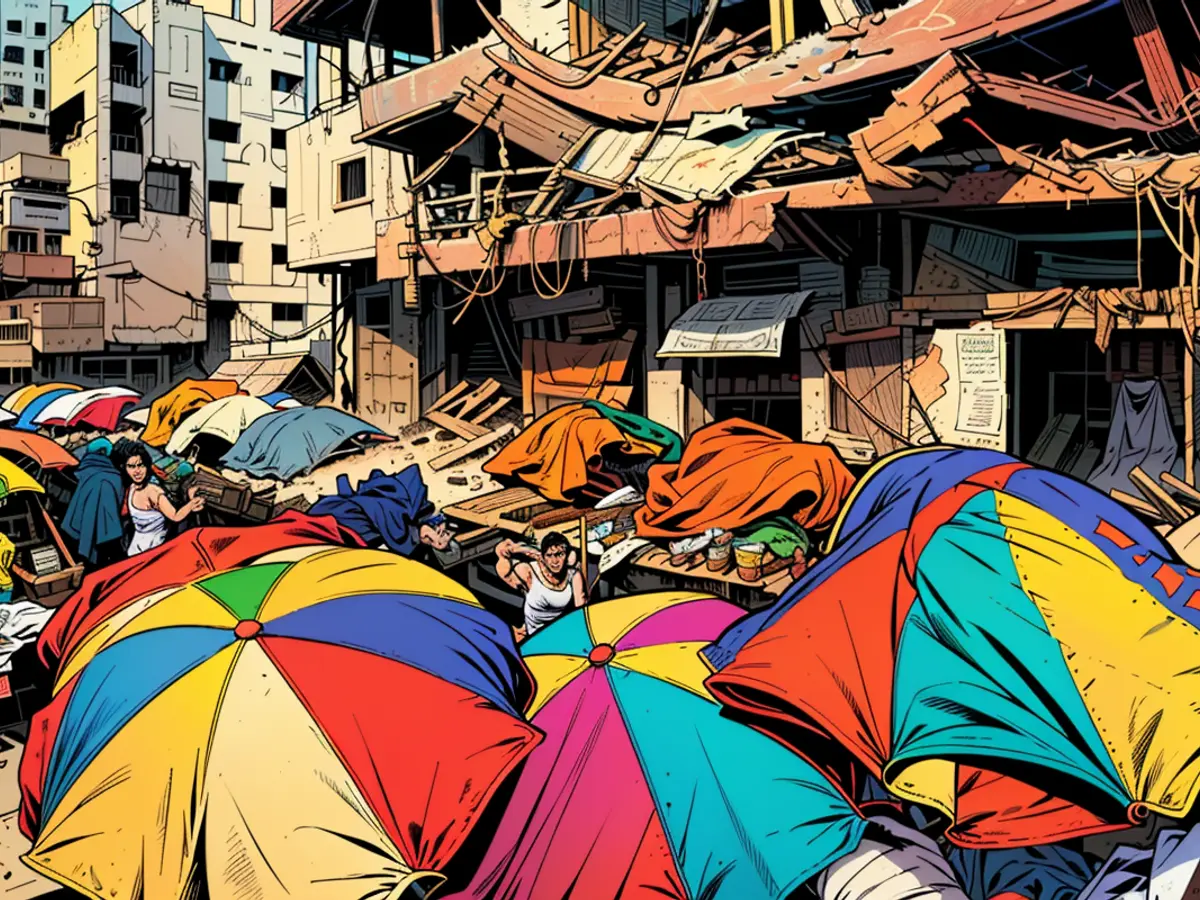Israeli military temporarily halts combat operations for daily humanitarian relief missions.
The military declared a ceasefire from 8:00 am to 7:00 pm (local time, 7:00 am to 6:00 pm CET), affecting the route from Kerem Shalom crossing to Salah-al-Din Street and beyond. This included the humanitarian route leading to the European Hospital in Rafah, about ten kilometers from Kerem Shalom. This decision was made after discussions with the United Nations and other organizations, but even with the truce, aid isn't reaching those in need yet.
The far-right Israeli Minister of National Security, Itamar Ben Gvir, criticized this humanitarian ceasefire as part of a "mad and unrealistic strategy."
The UN acknowledged Israel's move, but it hasn't led to more aid for the people in need yet. Jens Laerke, spokesperson for the UN Office for the Coordination of Humanitarian Affairs (OCHA), wrote in an email to the AFP news agency, "We hope this will lead to further practical actions from Israel to tackle the ongoing issues blocking meaningful humanitarian assistance in Gaza."
Aid organizations have been highlighting a crisis in the Palestinian territory for months, with a lack of food and essential items. Thousands of people are without enough water and food, and countless children are suffering from acute malnutrition.
This ceasefire was announced on the first day of Eid al-Adha, the Islamic Feast of Sacrifice. Umm Mohammed al-Katri from the Jabaliya refugee camp in northern Gaza Strip said, "This Eid is totally different. We've lost many people, there's a lot of destruction. We don't have the joy we usually have."
The conflict in Gaza started with a massive Hamas attack on Israel on October 7, where Islamic fighters allegedly killed 1194 people and took 251 hostages in the Gaza Strip. Since then, Israel has been carrying out extensive military operations in the Gaza Strip.
Reports from the Hamas-controlled Health Ministry, unverified independently, suggest over 37,300 people have been killed. On Sunday morning, there were no reported attacks, shootings, or fighting. However, the Israeli military stated there was "no lessening of hostilities in the southern Gaza Strip."
The day before, eight Israeli soldiers died in the southern Gaza Strip when their armored vehicle exploded near Rafah. The explosion was apparently caused by a roadside bomb or a Panzerfaust rocket, according to the army. In another operation in the northern Gaza Strip, two more soldiers were killed. These deaths made it one of the highest death tolls for the Israeli army on a single day since the war against Hamas began.
Netanyahu won't withdraw Israeli troops from Gaza until Hamas is completely annihilated. The Israeli government's actions in Rafah, where many Palestinians from other regions of Gaza had fled, are met with international criticism.
Even in Israel itself, the government's actions in Gaza are increasingly questionable. Thousands demonstrated against Netanyahu and his Gaza policy in Tel Aviv on Saturday, demanding new elections, stronger efforts for the release of hostages held by Hamas, and an end to military operations in Gaza.
The Israeli army clashed with the Lebanese Hezbollah militia again on Saturday. Hezbollah allegedly attacked an Israeli military outpost, Meron, from across the border with "guided missiles" and launched "attack drones" on another Israeli outpost. The Israeli army confirmed the firing of two projectiles at the military installation in Meron, but neither caused casualties nor damage.
Read also:
The temporary ceasefire in combat operations allowed for daily humanitarian relief missions from Kerem Shalom crossing to the European Hospital in Rafah. Israel's decision to halt operations was made in consultation with the UN and other organizations, but aid deliveries have yet to reach those in need.
The ceasefire announcement coincided with the Islamic Feast of Sacrifice, and Umm Mohammed al-Katri expressed her disappointment over the losses and destruction in Gaza. The conflict began with a massive Hamas attack on Israel, resulting in the deaths of over 1100 people and 251 hostages.
Despite the ceasefire, fighting hasn't halted completely. The Israeli military reported no lessening of hostilities in the southern Gaza Strip, while Hamas has not ceased its attacks. This was evident in the deaths of eight Israeli soldiers in the southern Gaza Strip, and two more in the northern region.
The Israeli government, led by Netanyahu, has made clear that troops will not withdraw from Gaza until Hamas is entirely defeated. This stance has faced international criticism, as well as protests inside Israel, demanding new elections, hostage releases, and an end to military operations.
The UN, through its spokesperson Jens Laerke, urged Israel to take further steps to facilitate humanitarian aid in Gaza. Aid organizations have been urging for months to address the crisis in the Palestinian territory, with thousands suffering from food and water scarcity, and children enduring acute malnutrition.
The Israeli military also clashed with the Lebanese Hezbollah militia on Saturday, with no reported casualties or damage. This incident followed reports of Hamas attacks, where Islamic fighters allegedly killed almost 40,000 people, an unverified claim by the Hamas-controlled Health Ministry.
The far-right Israeli Minister of National Security, Itamar Ben Gvir, criticized the temporary ceasefire as part of an unrealistic strategy to address the conflict in Gaza. The Israeli military butted heads with the Lebanese Hezbollah militia again on Saturday, with no significant damages reported.
Despite the conflict, aid deliveries still manage to slip through the cracks. On Sunday, a convoy of trucks made it through the Kerem Shalom crossing, carrying aid destined for the people in need in the Gaza Strip, as documented by the AFP news agency.







